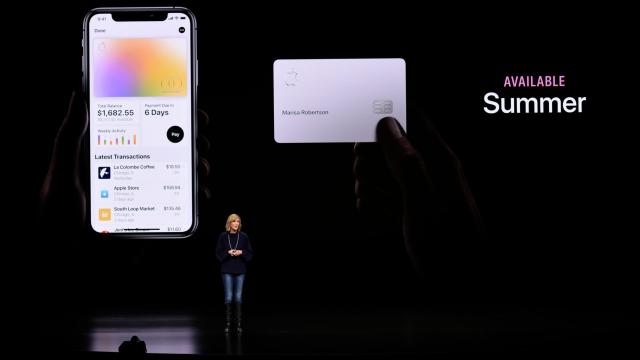When Apple announced its Apple Card nearly a year ago, it seemed like an alright card whose main selling point was enhanced privacy. Well with iOS 13.4, it appears that Apple has updated that privacy to allow for more anonymised data sharing with its banking partner Goldman Sachs.
Before you grab a virtual pitchfork, screaming about how it was inevitable that morally bankrupt Goldman Sachs would get its mitts on your data”it’s a little more nuanced than that. The changes, which were first reported by TechCrunch, are more tweaks to its existing policy than a stealth attack to upend your privacy.
The new policy is part of iOS 13.4 updates, and here’s the part that’s been changed:
You may be eligible for certain Apple Card programs provided by Goldman Sachs based on the information provided as part of your application. Apple may know whether you receive the invitation to participate and whether you accept or decline the invitation, and may share that information with Goldman Sachs to effectuate the program. Apple will not know additional details about your participation in the program.
Apple may use information about your account with Apple, such as the fact that you have Apple Card, for internal research and analytics purposes, such as financial forecasting. Apple may also use information about your relationship with Apple, such as what Apple products you have purchased, how long you have had your Apple ID, and how often you transact with Apple, to improve Apple Card by helping to identify Apple metrics that may assist Goldman Sachs in improving credit decisioning. No personally identifiable information about your relationship with Apple will be shared with Goldman Sachs to identify the relevant Apple metrics. You can opt out of this use or your Apple relationship information by emailing our privacy team at dpo@apple.com with the subject line “Apple Relationship Data and Apple Card.” Applicants and cardholders may be able to choose to share the identified metrics with Goldman Sachs for re-evaluation of their offer of credit or to increase their credit line. Apple may share information about your relationship with Apple with our service providers, who are obligated to handle the information consistent with this notice and Apple instructions, are required to use reasonable security measures to protect any personal information received, and must delete the personal information as soon as they have completed the services.”
Looking at this there are a few things to note. First, Goldman Sachs is getting a richer data set, but nothing that contains personally identifiable information. (But as many experts have pointed out, anonymised data isn’t always so anonymous.) The changed text also states some of the expanded data shared might be used to help Goldman Sachs in “improving credit decisioning.” That’s key here. When the Apple Card launched, there were several anecdotal discrepancies with who got approved, who didn’t, and what terms people got. Famously, Steve Wozniak took to Twitter to highlight how he ended up getting a credit limit that was 10 times that of his wife, despite them both sharing their assets. (Goldman Sachs quickly backpedaled.)
So part of the reason Apple is sharing more data”albeit anonymised data”is to create a new model that would allow more people who’d be rejected under the old model to obtain credit. This is one of those things where normally, that’d be a sign for alarm but in this specific case, it might be ok. It was worrisome when it appeared that Goldman Sachs was used the Apple Card myself, the limits are fairly low, the rates are fine, and there is a built-in tool that helps you visualise how your payments impact interest.
Apple gets some kudos for creating a new “Customer Assistance Program” for those affected financially by the novel coronavirus, in which interest charges are voided for customers who can’t make their March payments. It’s a testament to how much say Apple has over the card itself, as no capitalist bank would do this sort of thing if not mandated by the government. In fact, Citigroup passed on the Apple Card as it thought it was a “˜money loser.’ And hey, what better time to increase the anonymous data sharing in a program than at the same moment when you’re announcing a program to help people impacted by the coronavirus?
It’s also important to keep in mind that Goldman Sachs has always had access to Apple Card customer data”though, not transaction details. Apple’s site states that Goldman Sachs uses your data to operate the card, but will never “share or sell your data to third parties for marketing or advertising.” Whether you believe that or not, the Apple Card disclosure is better than most other credit card agreements. (Of course, what Goldman Sachs does with your data internally is another matter.)
Second, the policy updates still allow users to opt-in or out of sharing more personal data if they’re rejected for the card. This also isn’t a new thing”it’ll just now include more data like what Apple products you’ve purchased in the past, when you created your Apple ID, or how much you spend on Apple. You still get to opt-out of sending that information”even though burying it as an email in a privacy statement is kinda lame.
So all this is just to say that when it comes to usage, not much is changing with the Apple Card. It’s still a mediocre card when it comes to rewards”and privacy-wise, it is better than other credit cards out there even with these changes. That’s just an incredibly low bar because banks are bad. Still, it pays to keep an eye on these changes and remember that even the best credit cards are still operated by shitty, money-grubbing banks.
